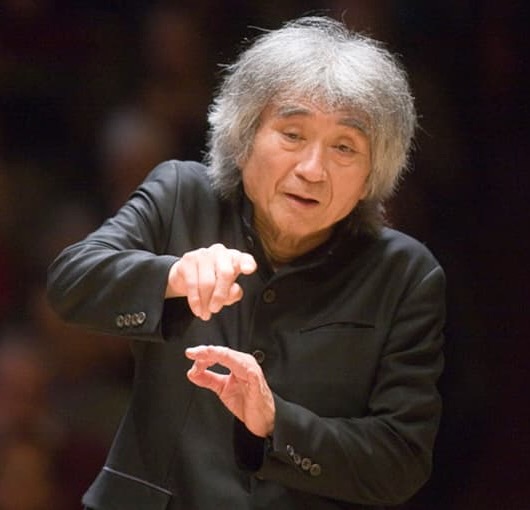Seiji Ozawa 1935-2024

Seiji Ozawa, who served as Boston Symphony Orchestra music director for 29 years, died February 6 at the age of 88. At the time of his death, Ozawa was the orchestra’s music director laureate.
In their statement announcing his passing, the BSO pointed to Ozawa’s importance for the orchestra and for classical music in the 20th century as a whole. Taking up his post in 1973 with an orchestra that at the time had a legacy as one of America’s finest ensembles, with a core repertoire of music from the romantic era, French composers, and a clutch of modern American works, Ozawa crafted a new presence and stature for the BSO.
“Under Seiji Ozawa,” declared the orchestra, “the Boston Symphony entered a global era, through a renewed commitment to commissions and contemporary music, a prolific number of recordings, radio, and television appearances, and history-making tours.” While preserving the orchestra’s trademark beauty of sound, Ozawa added music from Olivier Messiaen, Henri Dutilleux, and Toru Takemitsu, producing memorable concerts and landmark recordings that included the world premiere of Messiaen’s monumental opera, St. Francis of Assisi.
Ozawa was born September 1, 1935, in Mukden in the Japanese-occupied puppet state of Manchuko in northern China. In Japan from 1944, he studied piano and later, in music school, conducting (in part because a hand injury from playing sports effected his piano playing). He burst upon the scene in 1959, in the middle of the era of the great maestros, by winning First Prize at the International Competition of Orchestra Conductors. The following summer, Charles Munch—one of the competition judges and at the time BSO music director—invited Ozawa to Tanglewood, beginning Ozawa’s long tenure in North America. At Tanglewood, he earned the Koussevitzky Prize for Outstanding Student Conductor.
First serving as an assistant to both Leonard Bernstein and Herbert von Karajan (1960-1961), Ozawa later held music director posts with the San Francisco Symphony—his first professional post in America in 1962—the Toronto Symphony, and the Ravinia Festival, before taking his position in Boston (succeeding William Steinberg).
Known for his exuberant, nearly innocent passion, prodigious memory, and fluid technique on the stage, Ozawa had a vibrant public presence that equalled his mastery as a musician. He brought the BSO on tour to China in 1979, a time when that country was still partially closed to Western culture. He is remembered by millions for leading a global performance of Beethoven’s “Ode to Joy” to open the 1998 Winter Olympics in Nagano, Japan, as well as for a live performance at the foot of the Eiffel Tower on New Year’s Eve, 1999.
He won two Emmy Awards: for PBS’ “Evening at Symphony” in 1976; and an Individual Achievement in Cultural Programming award 1994, for “Dvořák in Prague: A Celebration.” His discography includes superb recordings of Bartók and Berlioz, Prokofiev, Ravel, Takemitsu, and a warm and gleaming Mahler Cycle.
Leaving the BSO in 2002, his career continued without let-up. He continued to serve in key positions at Tanglewood, was music director of the Vienna State Opera from 2002-2010, and founded the Tokyo Opera Nomori in 2005. Cancer and other debilitating health problems curtailed his performing and administrative work in his final decade-plus, but he did produce a fascinating 2016 book of conversations with novelist Haruki Murakami, Absolutely On Music. His final conducting performance was typically something both standard and out of the ordinary: on November 22, 2022, he lead the Saito Kinen Orchestra in Beethoven’s Egmont Overture, broadcasting it live to Japanese astronaut Koichi Wakata on the International Space Station.
Tributes to Ozawa came from the BSO and poured in from music organizations around the world. His death was mourned by the Berliner Philharmoniker, Vienna Philharmonic, Opéra de Paris, Carnegie Hall, Deutsche Grammaphon, Decca, and the Leonard Bernstein Office.
Current BSO music director Andris Nelsons said, “Without question, Seiji Ozawa was one of the world’s greatest conductors, and the Boston Symphony Orchestra was privileged to have had such a long and productive relationship with him as music director…as I began my tenure, I became keenly aware of the extraordinary impact that he had on this great institution, especially the incredibly talented players that joined the BSO under his nearly three-decade-long leadership…Seiji’s uncompromising love of music and heartfelt respect for the musicians with whom he worked was a tremendous example of orchestra leadership. He was a musician with a big heart, and I will greatly miss his humanity and serene grace. My thoughts are with Seiji’s family at this challenging time.”
BSO President and CEO Chas Smith concluded the orchestra’s statement by pointing toward the future: “Seiji’s deep commitment to excellence, education, and service will continue to guide us as we look ahead to the BSO’s 150th anniversary in 2031.”